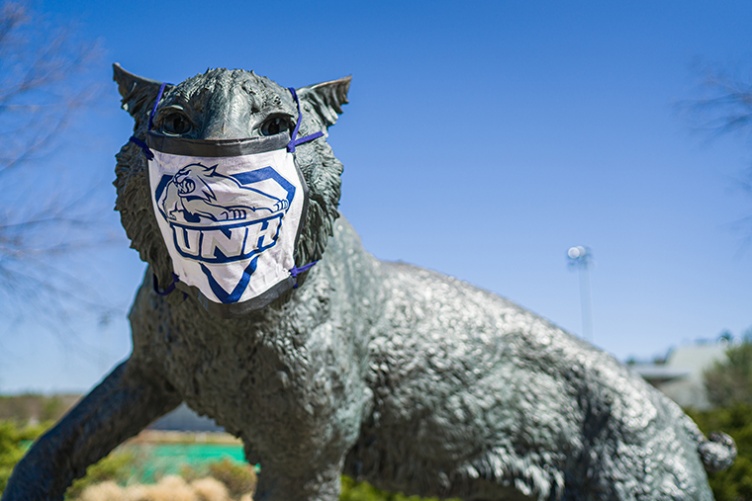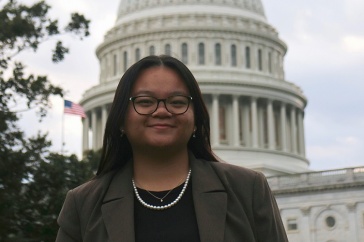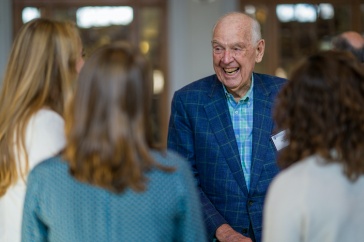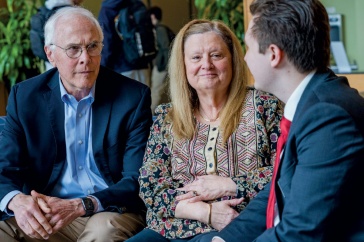
Even the Wildcat statue in front of the Whittemore Center is following COVID-19 safety protocols. Several weeks after campus shifted to a remote-learning model, students are still in need of financial help due to challenges and job losses brought on by the pandemic. Thanks to donors, they're getting the help they need.
In the early days of the COVID-19 crisis, UNH was doing what most other colleges across the country were doing: Rushing to shift learning and working to a remote format, hurrying to methodically and calmly empty campus as much as possible, and settling in for what would be a spring semester like no other in the school’s history.
Many UNH students have been hit with unprecedented financial hardships. Jobs they worked to help pay for expenses were suspended as businesses shuttered their doors. Some didn’t have money to get back home as campus shut down, or, once home, found they needed better technology to complete their now-online courses.
That’s where donors stepped in —and did so in an extraordinary way. Quickly and generously, nearly 500 alumni, faculty, staff, parents, friends and students gave to the Student Emergency Assistance Fund, designed to provide fast, temporary financial help to students in need. Early on, the effort was boosted by longtime donors Morgan Rutman ’84 and his wife, Tara, who made a $25,000 matching gift to the fund.
“I wanted to do something, albeit something small, to pay it forward and help our most vulnerable Wildcats in this most trying time.”
— Liam Sullivan ’21
Donations of all sizes began pouring in the very first week UNH shifted to remote working and remote learning — and students’ needs quickly surfaced as the pandemic worsened. As the crisis set in, Ted Kirkpatrick, senior vice provost for student life and dean of students who is running the program, was hearing from students daily. You can read two of those students’ stories here.
The goal of the fund, Kirkpatrick says, was to offer immediate relief. “A student might write me in the morning, and many times we can have that money available to them that afternoon. A lot of people have worked together to make this very easy and fast for the student who needs help.”
And it’s working. To date, about 500 students have received financial support from the donor-funded program. He says the ultimate credit should go to those donors who, facing whatever their own financial hardships might be, opened their wallets to help their fellow Wildcats.
“When this is all over, one of the things people will remember is: Who is really out there helping? These donors gave with a generous spirit; they are part of that group,” says Kirkpatrick.
Especially meaningful are the gifts from current students — the very group this fund was designed to help.
Supporting Students
This newest fund joins three recently created programs with similar goals of helping students in crisis. Swipe It Forward, allows for donations of money from donors or swipes from UNH Dining meal-plan customers for students experiencing food insecurity; Inn Between, a fund to support students facing homelessness, and the UNH Franklin Pierce School of Law Student Emergency Financial Assistance fund, which helps students at the law school in Concord.
By mid-May, roughly 600 donors had given a total of $184,000 to the four funds in just the past two months.
“So many UNH students, faculty and alumni have helped me to succeed and grow both professionally and personally,” explains Liam Sullivan '21, who gave to the fund. “I wanted to do something, albeit something small, to pay it forward and help our most vulnerable Wildcats in this most trying time."
Sullivan is majoring in Business Administration with a Finance concentration, and says while the pandemic has affected everyone, he recognizes that for some, the challenges are greater.
“I’ve had my fair share of annoyances and inconveniences caused by the COVID-19 pandemic, but I recognize that they pale in comparison to the problems of those who do not possess the means to weather a storm the likes of this one.”
The same paying-it-forward idea prompted Dan Kane ’97 to give. Now a paramedic and nurse based in Littleton, Mass., Kane believes in giving back by way of direct support for students in this unprecedented time.
“Many people helped me when I was a nursing student at UNH, now as a nurse, paramedic, and proud Wildcat, I have a chance to help current students manage this challenging semester,” he says. As for advice to this generation of Wildcats? Stay strong, says Kane. “You will get through this and go on to make all Wildcats proud.”
Sue Doe '81G knows first-hand how the COVID-19 crisis has affected college students. As a professor and director of composition at Colorado State University, she sees many students who are struggling.
“We had students who left so fast they didn’t even have time to take their books with them, some of them don’t have laptops, and even if they can get laptops, they don’t have good Internet,” she says. “We’ve had a few students who have just disappeared, and that absolutely breaks my heart.”
Doe, who earned a master's degree in English here, is a member of the UNH College of Liberal Arts Advisory Board. She met her husband, Bill, at UNH while they were both in graduate school — he earned his MS in civil engineering in 1980. They both have a strong affinity for their graduate alma mater and the Granite State; many relatives in Bill’s family are UNH alumni. So, while they’ve both received additional degrees from other institutions, they agree UNH has a “different soft spot” in their hearts. “We just have a love affair with the place,” Doe says.
Bonus: Advice for Students
Donor Sue Doe '81G, a professor at Colorado State, sends the same message to Wildcats as she does to her Colorado Rams: “You don’t have to do this perfectly to do it well enough. This is a time to be satisfied, to persevere and persist,” she says.
“Right now, good enough is good enough. Don’t seek perfection at this moment, from yourself or from others… demonstrate that we can survive this thing and come out on the other end. You will always look back at this semester and say, ‘I survived this thing. By golly, I did it.’”
Which made honoring UNH staff and faculty and helping UNH students an easy choice, says Doe.
“I’ve seen what people are doing to try to make this work for students. I am witnessing the challenges and remarkable courage of students, staff and faculty across the country as so many deal innovatively, generously and daily to support the longevity of higher education, which is so necessary to the education of future citizens of our states,” says Doe.
In late March, longtime donors Morgan Rutman ’84 and his wife, Tara, made a $25,000 matching gift to the fund. Morgan grew up at UNH (both parents were on the faculty) and has served on both the UNH Foundation Board and the USNH Board of Trustees.
Brian Fanning ’14 ’15G received his bachelor’s and master’s degree in music education from UNH and gave back to the fund in the early days of the crisis.
“I feel like I got everything, every little ounce I could out of UNH,” he explains, primarily through the Music Department, but also through the Hamel Scholars program, his study abroad experience in the Netherlands, and by participating in the SYMS Program.
He gave to the student emergency fund when he reflected on this thought: for most college graduates, dealing with a global pandemic was never part of their college experience.
“It’s just unfortunate that current students had to go through this, thinking about some of them who worked campus jobs but can no longer work. I’m remote teaching, but I’m still fully employed, and I know that can be a rare occurrence,” says Fanning, who is an elementary school music teacher in Georgetown, Mass. “I feel an obligation to try to give back while I still have full employment.”
He was also thinking of students who were already in the ‘disadvantaged’ group, as those will be the students most affected. “The longer this goes on, the whole time they’ll be getting further behind, not being able to catch up,” He hopes that his gift, and those of other donors, might make a difference for someone “at risk of fizzling out.”
History of the Emergency Fund
The fund was the brainchild of the UNH Faculty Senate, UNH Student Life and other groups across campus who all recognized the need, according to Erin Sharp, Ph.D., faculty senate chair and associate professor of human development & family studies in the College of Health and Human Services.
Last year, senate members heard from guest speakers and took part in programming to learn about financial vulnerabilities among the UNH student population, “to help faculty really see challenges that students are having outside of the classroom,” Sharp explains.
The original idea was to have a general emergency fund to help students who find themselves in a variety of tight spots — but just as the ink was finished on the paperwork, the pandemic hit, and the fund quickly became a COVID-19 emergency fund.
Share Your Story
Are you someone who donated money to the Student Emergency Assistance Fund — or a student who received help from the fund? We'd love to share your story. Contact Director of Donor Communications Michelle Morrissey at michelle.morrissey@unh.edu.
For Sharp, who is also the coordinator of the Adolescent and Youth Development Undergraduate minor, the topic of young adults at risk is a familiar one. Much of her research and teaching has focused on adolescence and transition to adulthood, and especially the transition of vulnerable, college-aged people.
“I couldn’t be more excited about the level of attention and support this fund had gotten,” says Sharp, who has been teaching at UNH since 2009. “We are all here for our students, and this is no better way to show that. All of us who work on this campus have that same mission.”
Beyond her research, the goal of the fund hits home for Sharp.
She enrolled in college at 18, but failed out due to personal challenges that kept her from being successful. “I took four years off and went back, with much successes. So I’ve always been really sensitive to the struggles that our students have outside the classroom,” she explains. “For me, this fund is a great way to support students facing those kinds of problems.”
For Dean Kirkpatrick, the mission of the fund also strikes a personal chord. Kirkpatrick attended a private liberal arts college for his undergraduate degree. As one of five children, “there wasn’t a lot of money coming from home” he recalls and so he worked and took out loans to make ends meet for those four years. “A lot of us were working crappy jobs to pay bills, while other students were spending summers vacationing in the Mediterranean,” he says, recalling his first introduction to the culture of the haves and have-nots. He recognizes that in a global pandemic like this, students of every socio-economic background might need help, “I wanted to make sure this fund was really geared toward students who, through no fault of their own, didn’t have those safety nets that others have” during an emergency.
Impact on Students
In addition to students like Jake and Jamila, the fund has also helped students like Eileen McKenna, a rising junior in UNH’s equine science program.
Make a Gift
You can help students like Eileen and others by making a gift to the Student Emergency Assistance Fund. To donate, visit unh.edu/give.
“I’ve always been a crazy horse girl,” jokes McKenna, a Hamel Scholar who is isolating with her family at their home in Melvin Village, N.H. She wants to go to veterinary school after UNH and had been working at Kittery Animal Hospital until the pandemic hit. She also had a summer job lined up at Castle in the Clouds, a historic estate and popular tourist attraction in Moultonborough, N.H.
She had recently signed a lease for an apartment in Durham for this fall and had done all the math to figure out how many hours she’d need to work at her two jobs to make ends meet and pay her rent and bills. Her plans were set, until COVID-19 changed them.
While she worked on filing for unemployment, she sought help from the Student Emergency Assistance Fund after seeing a friend share her story on social media. “It’s such a stressful time, but the bills don’t really stop. A lot of people right now are in the same boat as me: we’re young so we don’t have a lot of savings, we’re going to school full-time,” she said. “I don’t like to take money from people like this … I had plans to be working and making my own way. But I really appreciate that there’s the opportunity to get help and am so thankful for the kind people who are giving to this fund.”
Adding a complication is the fact that McKenna was recently diagnosed with Lyme disease after being bitten by a tick — she was diagnosed quickly, but associated medical costs are just another expense she and her family must bear.
She said she hopes some day when this is all behind us, she can do the same for someone else. That’s what Kirkpatrick says to students who are receiving this help.
“All of us had a helping hand to get to where we are,” he says. “I tell students there are no strings attached to this help, we only ask that one day in the future, they might help someone in the same way if they can.”
-
Written By:
Michelle Morrissey ’97 | UNH Magazine | michelle.morrissey@unh.edu




















































